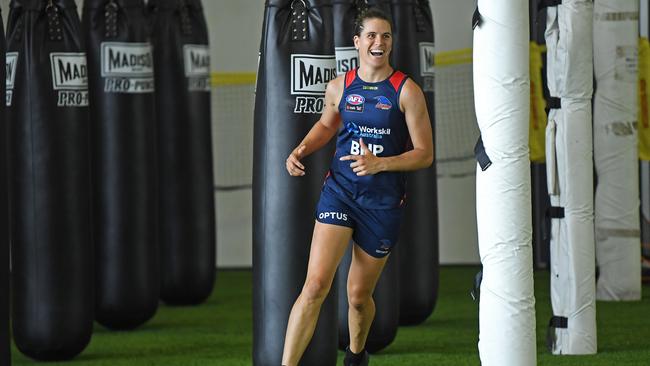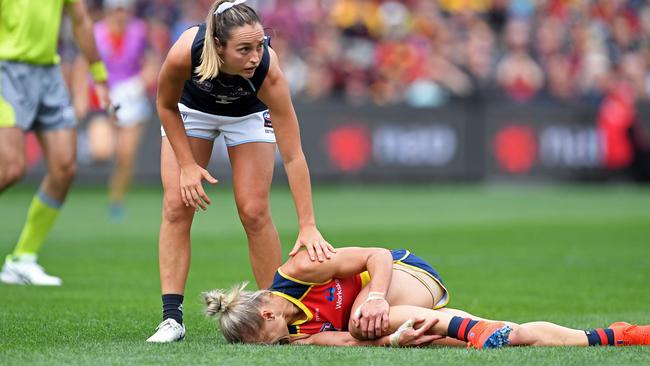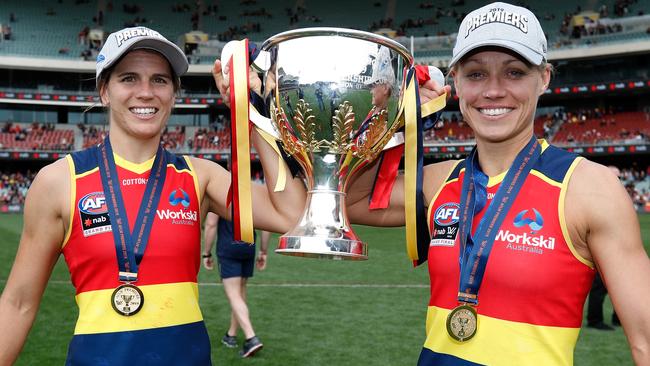Leading sports doctor Peter Larkins says more research is needed for female footballers suffering ACL injuries
Footy doctor Peter Larkins expects the number of AFLW players suffering ACL ruptures to increase, and is urging the league to do more to reduce the high amount of season-ending knee injuries from occuring.
Local Sport
Don't miss out on the headlines from Local Sport. Followed categories will be added to My News.
- Crows co-captain to miss 2020 AFLW season with ACL injury
- How to get the most out of your Advertiser digital subscription
Leading sports doctor Peter Larkins is urging the AFL to conduct more research around reducing the high number of female footballers tearing their anterior cruciate ligaments.
Dr Larkins’ comments come in the wake of Crows co-captain Chelsea Randall becoming the fifth Adelaide-listed player to succumb to the season-ending injury in the past 12 months.
The Crows admit their tally of five is too high, as expansion teams Richmond and St Kilda reveal they have had one player each go down with an ACL injury this year.
Fremantle have had at least two, while GWS and Carlton have recorded none to AFLW players in the past 12 months.
Stream over 50 sports Live & On-Demand with KAYO SPORTS on your TV, computer, mobile or tablet. Just $25/month, no lock-in contract. Get your 14-day free trial and start streaming instantly >

Dr Larkins said he was unsure on the Crows’ prevention techniques, but told The Advertiser the AFL and all clubs must put more time and effort into researching ACL injuries and female biomechanics.
“The training program is relevant because some clubs put an enormous amount of time into preventive exercises with things like landing and strengthening and stabilising exercises for the knee,” he said.
“I’m not going to criticise Adelaide because I don’t know whether they are or they aren’t (doing that).
“Inevitably, Chelsea will not be the only one (this season).”
Randall’s injury follows that of co-skipper Erin Phillips and young gun Chloe Scheer who tore their ACLs during the Crows’ flag win against Carlton in March.
Both players are rated a chance of returning in 2020.

Dr Larkins said women’s knees were shaped differently to men’s and they generally had less muscle strength around the knee, which was why tailored training programs were needed.
“I think the message to the AFLW is assess the girls and the clubs,” he said.
“The sports science and injury prevention teams have got to assess all the girls coming into the program.
MORE NEWS
Crows hook Fischer with first-round pick
Young gun draftees happy to move to SA
The sun will still come out tomorrow: Randall
“(They) have a look at any predisposing factors to their body design, their strengths and deficits around the muscles that control their ACLs and put them in a prevention program.
“We are never going to stop ACL (injuries).
“You can’t control certain physiology aspects of it, but you can certainly control people who have got poor muscle control or are not training properly.
“It’s potentially going to alert some people … they (the AFL) are going to have to address one of the most difficult injuries and try to avoid having it.

“That might mean they’ve got to do very specific training for the demands of changing direction and landing, and the things that aren’t present in other sports.
“I think there has to be a really dedicated prevention program at the clubs that starts well before they get on the track.”
According to the inaugural AFLW injury report released in September last year, torn ACL injuries increased from 4.31 per 1000 hours in 2017 to 6.47 in 2018.
Women are 9.2 times more likely than men within the AFL system to sustain an ACL injury.
Adelaide midfielder Hannah Martin ruptured her ACL in July playing for the NT Thunder in the off-season and will also miss next season.
The Crows also lost ruck Rhiannon Metcalfe for its 2019 campaign after she tore the ACL in her left knee during an innocuous tackle in Adelaide’s trial game against Fremantle.
